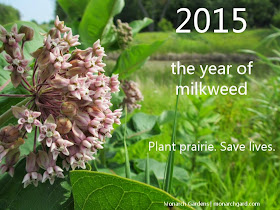"Our moral vision and imagination are tied to the vocabulary we use. Today the dominant ethical language comes from words like freedom, interests, rights, and justice. The meaning of each of these ideas is keyed to principles or rules rather than to relationships. Is this language inclusive enough to allow for all that needs to be said concerning human responsibilities for flourishing and resilient biotic and civic communities?"
This is exactly why it's so hard to advocate for change in landscape design -- our language is so often inadequate to how we experience the world, and even I might add, to how we respond to it based on our own ethical and moral codes (even if or especially if those codes are right on target -- something misfires between thought and action). Our relationships to nature are so much more visceral.
"[...] beliefs and feelings that lead to human behavior are most often rooted in the lived experience of a specific place, one with particular natural and social characteristics, landscapes, and cultures. To change the way one thinks and feels about a place is to change how one uses and relates to it. An ethical vocabulary adequate to the ecological challenges of our time must have the power to do far more than our current language of freedom, interests, happiness, rights, and justice."
If we use our gardens as places primarily for our own aesthetic experience, doesn't that cast ownership over the landscape which excludes other life from the landscape? That may in fact alienate us from the landscape in deeper, unnoticed ways. Aldo Leopold might think so. When we call a landscape "beautiful" we ascribe value based on personal experiences, judgements, and social / ethnic / economic background. Happiness is not freedom when it excludes the well being of other creatures that also, as it so happens, directly contribute to our literal physical well being in the form of ecosystem services.
Here's a bit from Steven Sullivan's essay Finding Your Own Passenger Pigeon:
"What I am not content with is the fact that we, as a single and supposedly sapient species, are arbitrarily and ignorantly destroying biodiversity at a rate unprecedented in more than 4.5 billion years. Whether you take the perspective that such biodiversity is the conscious product of a deity’s creation or is the happy accident of amazing natural processes, the destruction is unconscionable. If this rapacious consumption were the result of a single individual’s avarice, perhaps this behavior could be seen to have some kind of justification. But our destruction is not the result of a single person. It is the result of collective decisions: decisions made in the home, the store, and the voting booth; decisions we advertise through our behavior and our bellies. These decisions are not solitary. They affect the world. Your decisions affect me and mine affect you. Daily, even hourly, the news reports how such decisions affect us on a strictly economic basis. Few people are attempting to quantify how such decisions affect us on an ecological basis."









